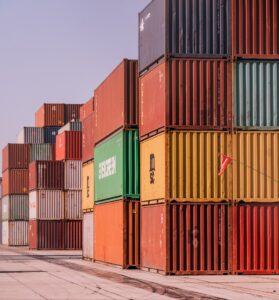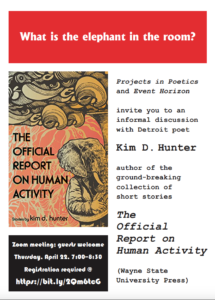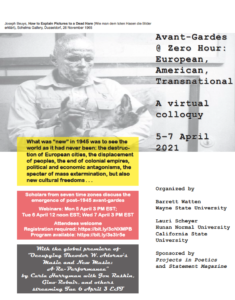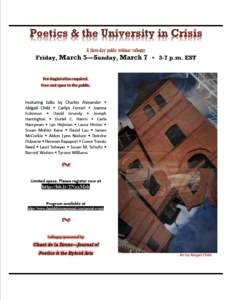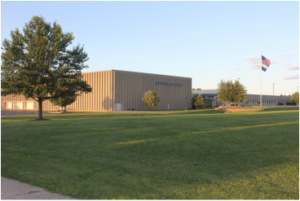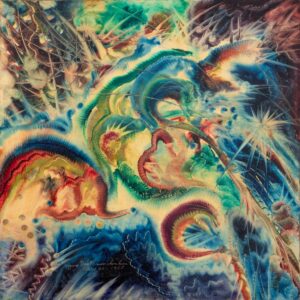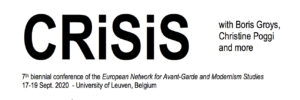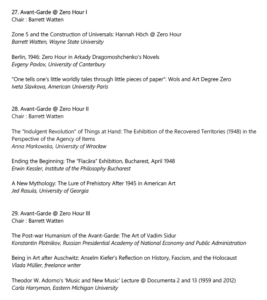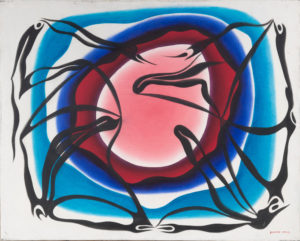The global circulation of ideas advances with the publication of the Journal of Foreign Languages and Cultures, vol. 5, no. 1, edited by Laurie Scheyer from Hunan Normal University. As with last year’s special forum on “Modernity @ Zero Hour,” this issue contains a set of papers—distributed through a capacious issue with numerous related themes—that developed in an online webinar, “Avant-Gardes @ Zero Hour,” which took place during conditions of COVID in March 2021. The webinar itself, thanks to Zoom, was itself global and involved participants from seven time zones, from New Zealand to Moscow. It also could include a performance event, the in-time screening of Carla Harryman’s “Occupying Theodor W. Adorno’s Music and New Music: A Re-Performance,” originally proposed for the canceled EAM conference in Fall 2020. In this best of all possible worlds, our proposed event went forward; papers were presented, comments generated, drafts revised, and the results are now distributed to the world at large. Below I list the contents and link to the six papers that were the result of that effort, seen as part of a larger conversation in a global framework. Indeed my own contribution, “The Global Archive and the Future of Poetics,” looks at the form of the global exhibition after the German documenta, but it easily applies to what we are doing here. … More
>> Documents <<
April 21, 2021
Document 92: Event Horizon
Kim D. Hunter
The Official Report
on Human Activity
Zoom discussion
Thursday, April 22
7:00–8:30 P.M. EDT
Projects in Poetics and Event Horizon announce an informal discussion with Detroit poet kim d. hunter, author of the ground-breaking collection of short stories from Wayne State University Press. Guests are welcome; register here: https://bit.ly/2Qm6tcG.
The Official Report on Human Activity, which is neither official nor a report, is a collection of long stories that are linked by reoccurring characters and their personal struggles in societies rife with bigotry, in which media technology and capitalism have run amok. These stories approach the holy trinity of gender, race, and class at a slant. They are concerned with the process and role of writing intertwined with the roles of music and sound. … More
March 19, 2021
Document 91: Avant-Gardes @ Zero Hour
Avant-Gardes @ Zero Hour: European, American, Transnational
Monday, April 5–Wednesday, April 7
A virtual colloquy featuring 16 scholars, writers, artists
& the global premiere of Carla Harryman’s “Occupying
Theodor W. Adorno’s Music and New Music: A Re-Performance”
attendees welcome; registration required; click here
Originally organized for the 2020 conference of the European Network of Avant-Garde and Modernist Studies (EAM) conference in Ghent, Belgium, canceled due to COVID-19 (here), and following last year’s virtual colloquy on “Modernism @ Zero Hour” (here). The seminars have been reorganized and expanded, with participating scholars and artists from seven nationalities and time zones, and with the addition of the streaming of Carla Harryman’s revised production of “Occupying Theodor W. Adorno’s Music and New Music,” originally staged at dOCUMENTA 13 (2012). The colloquy takes up transnational approaches to the emergence of avant-garde art and practices after the metahistorical date of “Zero Hour,” 1945—the end of the war which is not one—to comprehend the profound reflection on destruction, displacement, and a new global order in post–1945 movements and works.
Organized by Barrett Watten, English, Wayne State University
and Lauri Scheyer, British and American Poetry Research Center,
Hunan Normal University
Sponsored by Projects in Poetics and Statement Magazine,
California State University, Los Angeles
… More
February 23, 2021
Document 90: Poetics & the University in Crisis
Poetics & the University in Crisis
Friday, March 5–Sunday, March 7 / 3:00–7:00 P.M.
featuring 22 poets, critics, teachers, artists
free registration required; click here
A virtual colloquy on the role of poetics in the American university in crisis, for a nation also in crisis. The humanities and arts continue to be major targets of increasingly austere budgets—and so, too, has critical thinking. How can poetics—as inventive, intellectually engaged creative series of practices and modalities of thought—offer an intervention into this moment? How can the university re-embrace the necessity of art based in critical thinking and open inquiry that includes the aesthetic and the political? The three days of this colloquy will aim to unite creative poetic practices with analytical critique and pedagogy from a wide range of voices, methods, points of view.
December 25, 2020
Entry 42: Hello, Indiana!
On 4 December, this year, I was emailed by John Pratt, English teacher at Greensburg High School in Indiana, asking if I would read for his program (virtually), and send a shout out to the students. Greensburg has experienced two waves of COVID and was forced to return to all-online classes; the readings would be an end-of-year bonus for students. I also see it as an effort to communicate between “regions” of the pandemic: Indiana, a red state with huge uptick in cases in December, and Michigan, a blue state where a similar surge was somewhat damped but still compares with other Midwestern states, as I know from the Michigan Coronavirus page [here].
With a population of 11,000, our small town of Greensburg Indiana was hit hard by the pandemic in March and last week it returned with full force. Once again Greensburg High School has been moved to virtual learning. As one of our teachers, I have launched a campaign to provide an inspiring lesson for our over 700 students. It is called The Bucket List—Our Greatest Poets. I have sought out those who I feel would inspire us with a few words. Would you be willing to read a poem for my students? Simply tape yourself saying who you are, give a shout out to Greensburg High School students, then read a poem. Thank you for your consideration and have a great week.
No problem, you bet. On 14 December, I recorded a section from my poem of the COVID duration, “Notzeit (After Hannah Höch),” with a short exhortation to the students to write about what they have learned from strange times:
John Pratt, in turn, posted the video to his Virtual Chautauqua page [here], which provides links to the fifteen poets who responded; I was pleased to see myself in company with Eileen Myles, Martín Espada, and other poets new to me. The readings are marvelous, unified by the prospect of speaking to youth across time zones, and worth the time clicking through. … More
October 1, 2020
Document 89: Avant-Gardes @ Zero Hour
CALL FOR PAPERS
Avant-Gardes @ Zero Hour:
European, American, Transnational
American Comparative Literature Association
Virtual conference, 8–11 April 2021
This seminar continues the work of “Modernism @ Zero Hour,” focusing on European, American, and transnational avant-gardes after the epochal moment of “Zero Hour,” 1945. At a moment of crisis and renewal, modernity is disclosed in a process of “systemic detotalization” that new avant-garde tendencies interrogated in forms of mimetic activity, at once preservative and self-undoing. The destruction of European cities, the displacement of peoples, the end of colonial empires, political and economic antagonisms, the specter of mass extermination, but also new cultural freedoms are enacted in a broad range of aesthetic, philosophical, and political forms, differing substantially from the historical avant-garde. What was “new” in 1945 was to see the world as it had never been, as a locus of destruction and creation on a global scale. Seminar topics could include transnational routes for the avant-garde: the global influences of surrealism and existentialism; the ethical imperatives of “bare life” and abstraction; the eruption of absurdism; cross-racial aesthetic motives and possibilities; the circulation of new cultural forms such as American jazz in Europe or New Wave film in the U.S.; the tension between avant-gardes, state formations, and ex/repatriation; and aesthetic movements of the global South that oppose the spatial hierarchy of prior avant-gardes. In each instance, radical form addresses modernity in crisis and the inauguration of a new global order in unique ways.
Submit proposals to ACLA by Saturday, October 31
For ACLA portal, click here; for seminars, click here
Contact barrett.watten@gmail.com for more information
Image: Eugene Von Bruenchenhein, No. 583, 30 April 1957
September 16, 2020
Document 88: Crisis @ EAM
The weekend of 17–20 September was to have been seventh in a series of biennial conferences of the European Network for Avant-Garde and Modernist Studies (EAM). I have been presenting at EAM since their first meeting in Ghent, Belgium, in 2008. Each of the meetings that followed was remarkable, and opened a window onto new vistas on the aesthetics and politics, in fact the historical importance, of avant-garde and modernist studies—an expanding field that departs significantly from its Eurocentric origins and turns toward postcolonial and post-socialist contexts. The latter was encouraged by meetings in Poznan, Poland, and Helsinki, Finland, where I met a number of Eastern European scholars, and that connection is an important aspect of my organization of a seminar on “Avant-Garde @ Zero Hour.” The seminar was to focus on radical formal innovation in the crisis of the immediate postwar period, seeking different frameworks for the avant-garde than those that define the “historical avant-garde”—seeking a different register of the historical, in fact, one that eschews any form of progressive historicism for the crisis, destruction, discontinuity, and universality that attends the Zero Hour.
As it happened, the conference was canceled due to the current crisis. Much reflection may follow on the nature, and specificity, of “crisis” in its many instances. My proposal for the seminar may be found here; the conference CFP is linked here and above; and below is the line-up for our seminar. I will update this page with a link to full conference program soon; while the organizers have proposed a conference volume on our evolving understanding of crisis, with the avant-garde as both instance and guide.
March 14, 2020
Document 84: Modernity @ Zero Hour
Modernity @ Zero Hour:
The Question of the Universal
and the Origins of the Global Order
ACLA Nonsite Seminar
March 20 and 21, 2020
With the cancelation of ACLA 2020, seminar members have agreed to hold a virtual seminar using conferencing software, across two continents and four time zones, consolidated into two sessions. A small number of invitations for non-presenting participants is available; contact organizer at address below.
Modernity @ Zero Hour I
Friday, March 20, 10:30 AM –1:00 PM
Barrett Watten, Wayne State University: “Modernism @ Zero Hour: Anticipatory, Punctual, and Retrospective Universals”
Maggie Rosenau, University of Colorado, Denver: “Objectivity: A Moment of Intersection Between the Avant-Garde, Denazification of the German Language, and Literary Goals after the Zero Hour”
David Kellogg, Coastal Carolina University: “Modernist Non-Events: Trials of Modernism in Malaya and New York”
Herman Rapaport, Wake Forest University: “Dismantling Modernity”
Modernity @ Zero Hour II
Saturday, March 21, 10:30 AM –1:00 PM
Lauri Scheyer, Hunan Normal University (China), “Modernism and Black Nationalist Identity: The Diaspora Before and Since the Zero Hour”
Parvinder Mehta, Wayne State University, “Fractured Feminine Selves and Autospecular Affect: Global Modernism and the Postcolonial Artist as a Woman in Meena Alexander’s Writings”
Zhai Yitian, SUNY Buffalo: “Sexual Difference, YinYang, and the Critique of Universals in Simone de Beauvoir and Luce Irigaray”
Gary Huafan He, Yale University, “Entropy and Utopia @ Zero Hour: Modernity and the Manhattan Project” … More
October 26, 2019
Event 87: Metropole

New York, 4–8 October 2019
“It’s nice to have a separate month” —Bill Berkson
Friday, October 4
Delta DTW > LGA
Tony Torn
Walt Whitman’s Words
@ The Center for Book Arts
Marjorie Welish
Christian Marclay @ Paula Cooper
Ishiuchi Miyako @ Fergus McCaffery
Teresa Burga @ Alexander Gray
Pope L., Jonathan Lyndon Chase,
Cheyenne Julien & Tschabalala Self
@ Mitchell-Innes & Nash
High Line Hotel … More
September 8, 2019
Document 80: Refunctioning Poetics
CALL FOR PAPERS
Refunctioning Poetics
The Louisville Conference
on Literature and Culture After 1900
University of Louisville, February 20–22, 2020
Organizer: Barrett Watten / contact by September 16
This is a call for one or two participants for a session on the “refunctioning” of literature (focusing on poetry and poetics in terms of “the making of the work” but including other genre possibilities). Recent texts suggesting such a “refunctioned” poetics include Lyn Hejinian’s Positions of the Sun; Kevin Killian’s amazon.com writings; Eugene Lim’s cyber-novels; and others proposed by panel participants. The concept of “Refunctioning” (Umfunktionierung) comes from Walter Benjamin, via Bertolt Brecht, in his keystone essay “The Author as Producer” (1934). How can new forms and genres of poetics be seen as “refunctioning” the aesthetic as political, given that Benjamin’s world has been “refunctioned” in the “new presentism” we live and suffer? Returning to Benjamin’s 1934 essay, in the context of the struggles against fascism but also in contestation with socialist realism, the panel asks, what does “refunctioning” authorship, and the literary and cultural work, mean in the present? Participants may approach this question by rethinking the status of the author; theorizing poetic making from a gendered perspective; seeing material production and digital reproduction as central for rethinking poetics as “the making of the work”; and reading new genres of experimental writing, after the Millennium, that incorporate its precarious presentism.
